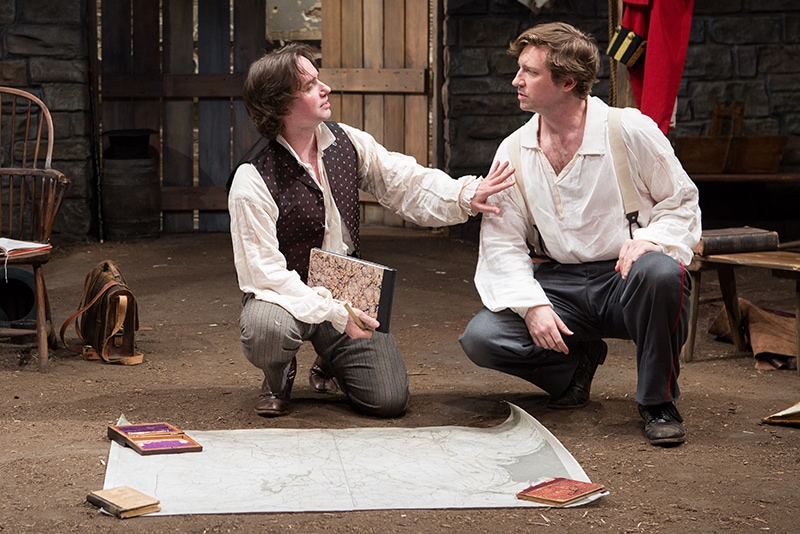Studio Theatre’s take on Translations by Brian Friel (1929-2015) is one crackling fine production. It begins as an intellectually stimulating comedy, then ultimately turns tragic after weaving through many an intersection and crossing some deep divides.

Friel sets the time for his Translations as 1833. The place is called Baile Beg, a small rural community close to what is now Northern Ireland. We meet a group of local characters at an informal Irish-language school known as a “hedge” school. The students are ready to study classics of Greek and Latin literature, arithmetic, and other lessons under the prodding of an old master teacher. The students are men and women, but are no longer children.
But change is surely coming to the rural community. British army engineers are arriving to map the area, draw new borders, as well as translate and standardize place names into English. The Brits also bring new concepts such as free, mandatory, public schools to replace the long-standing “hedge” schools where education is paid for with bartered milk as currency, and where religion can battle for a superior position. The English also seem to offer new ways into the modern commerce of the day, beyond small farms and potatoes.
Friel’s handsomely developed script is under the ace direction of Matt Torney, Studio’s Belfast-born associate artistic director. Performed by a crackerjack 10-member ensemble, the characters come across as earthy and complex, disconcerting and bemusing. They are everyday folk of vastly different ages and outlooks, along with a couple of English soldiers. In general, under Torney, the acting style is one of terrific humbleness.
A most interesting dramatic component of Friel’s Translations is that while the characters generally speak English as heard by the audience, within the play we the audience are expected to accept that the characters are speaking Irish to each other (though we the audience usually hear English) while a translator intervenes so that two British officers understand what the locals are saying. And when the British officers speak English, the translator interprets for the local citizens. Well, more or less.
Some of the characters that caught my attention for their skillful acting talents and the characters they portray include:
Bradley Armacost as Hugh the hedge-master teacher who knows the old ways, yet can see the future will be different. He often speaks the words of a prophet such as:
-“a civilization can be imprisoned in a linguistic contour which no longer matches the landscape …of fact.”
-“I am a barbarian here because here I am not understood by anyone”
-“to remember everything is a form of madness.”
Erin Gann as Owen, the hedge-master’s son who had left for Dublin and has returned to act as a translator for the Royal Engineers. Is he a traitor to his Irish roots, is he a spy, does it matter what he is? For no matter what he may be called, he is still himself as he sees it.

Molly Carden as Maire, who desperately wants to learn English at first to go to America, and then as her affections for one of the British officers grow.
Cary Donaldson as Yolland the young English officer who falls in love with Ireland as a place and a fantasy and then falls in love with Maire. In trying to learn Irish and become one of them as best he can, he knows that is likely impossible He says, “Even if I did speak Irish, I’d always be considered an outsider here, wouldn’t I? I may learn the password but the language of the tribe will always elude me, won’t it? The private core will always be …hermetic, won’t it?”
And for one line of dialogue that he delivers with aplomb is Martin Giles as Jimmy Jack a man who has passed his prime. Yet he knows about the anger of crossing tribal boundaries (English and Irish) to marry, and of the damage that can be done by the tribes to those who want to go beyond ancient tribal boundaries.
The visual tone of the costumes by Wade Laboissonniere is rough-honed and matches the circumstances of the characters. The ersatz, stone, one-room set design from Debra Booth perfectly fills the Metheny Stage giving off the scene of dankness befitting the lower depths.
Brian Friel’s Translations (1980) is a production to savor at Studio Theatre. It is both tender and edgy. It is chock full of words that are signals to be decoded. The show ends with ambiguity, which is fitting. That allows an audience to decide for themselves what may happen next as they leave the theater venue.
But, at the very heart of the play is how do we communicate to one another. What are we saying and what does another hear especially if we speak a different language and have a different culture? And what is the importance of what is left unsaid?
On its surface, Translations is about Ireland and England, but it is so much more. I bet Tevye would understand what Friel was getting at with his tale about some who are risk-takers in their attempts to survive.
Running time: Two hours and 30 minutes, with one intermission
Translations plays through April 22, 2018, at Studio Theatre – 1501 14th Street NW in Washington, DC. For tickets, call the box office at (202) 332-3300, or purchase them online.




